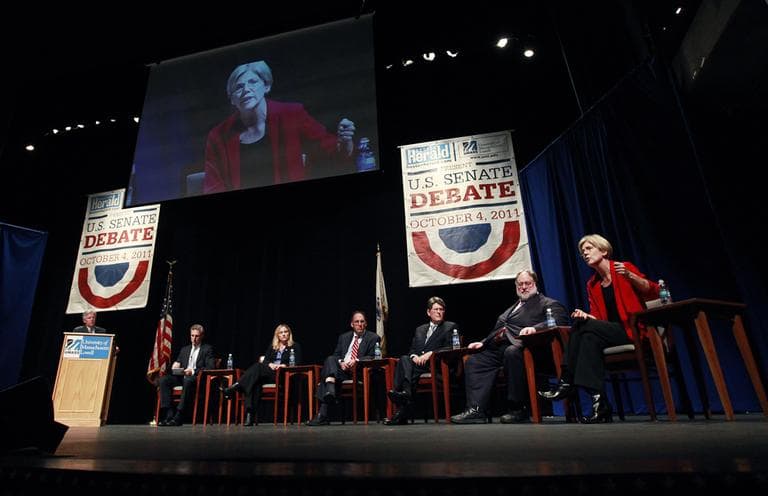Advertisement
At The Democratic Debate For Senate, Warren A Standout
Resume
On Tuesday night, for the first time, voters had a chance to see and hear the six Democrats vying to unseat Republican Sen. Scott Brown.
They squared off in a 90-minute debate hosted by the University of Massachusetts Lowell. The six candidates didn't attack one another during the debate at UMass Lowell, but rather set their sights on Brown.
Here's City Year co-founder Alan Khazei, who is running for Senate for a second time:
Scott Brown had an opportunity to be a game-changing leader. He was a national figure overnight and he was the pivotal vote for a year. He's delivered nothing.
The other Democratic contenders are: Tom Conroy, a third-term state representative; immigration attorney Marisa DeFranco; Bob Massie, former nominee for lieutenant governor; Herb Robinson, an engineer and activist; and Harvard University law professor Elizabeth Warren.
WBUR's Fred Thys was there and joined Morning Edition Wednesday to talk about a few of the key takeaways from the debate.
Bob Oakes: Elizabeth Warren, the front-runner in the polls, stood on stage for the first time. It was her first opportunity to debate with her opponents. How did she do?
Fred Thys: She did a good job. She positioned herself, which is key. Since she started this campaign she's been portraying herself as standing up for the middle class, and that's what she did Tuesday night.
Here she is taking aim at Wall Street:
The people on Wall Street broke this country and they did it one lousy mortgage at a time. It happened more than three years ago and there has still been no basic accountability and there has been no real effort to fix it. That's why I want to run for the United States Senate. That's what I want to do to change the system.
I should note this was not a neutral audience; the Warren supporters had packed the hall.
The other five Democrats in the race had their first chance to have a go at Warren since she jumped into the race and almost immediately became the front-runner. How did they do in their efforts to undermine her?
Not so well because they weren't able to outshine her. She had very impressive answers. The only opening that anyone tried to make on her was on the question of PAC money and that came from Massie. He challenged Warren on her accepting money and he challenged her not to take any more PAC money, but it fell flat because she never had to answer the question.
Because the moderator didn't force her to answer the question?
The moderator never followed up. There really wasn't much follow-up, there was very limited interaction between the candidates, it was very much one question, one candidate, let's move on to the next.
So how did the other candidates stack up then?
All stood out in one way or another. For example, Robinson was very funny. They were all asked what superhero they would be, and he said he would be the Incredible Hulk. It's funny because he's a big guy.
Some demonstrated good command on a lot of the issues, a broad range of issues. That was the case with DeFranco.
And Massie got to introduce himself as someone who has overcome adversity in his life. As a child he was a hemophiliac. As the result of several medical procedures he's actually not a hemophiliac anymore.
And here's what Conroy said about why he would be the best candidate to go against Brown:
I would love to have the opportunity to compare my voting record at the State House — good Democratic principles — against Scott Brown's. My list of accomplishments and achievements against Scott Brown's. And next to me, he will come across as nothing more than an empty suit with an empty list.
Like Conroy, all the Democrats took aim at various times at the incumbent, who of course was not on the stage with them. Who was the most effective?
Warren was really the only one who did it in a very effective way because what she did was, again, she positioned herself as the candidate of the middle class, as the defender of the average person, which is of course how Brown has been presenting himself.
The candidates addressed a broad range of questions, many of them put to them by UMass Lowell students. What issues emerged as the most prominent issues, and could some of the answers given last night come back to bite the candidates at some point later in the campaign?
Right, this is the classic problem. Democrats, in front of a liberal audience, give very liberal answers and then they have to go up against a Republican in the general election. So Warren, for example, talked about intervening in the market to help out people who face foreclosure. Well that sounds great in front of a Democratic audience, but how are voters going to react to having their taxes bail out people who had made bad decisions? That is potentially something that Brown could exploit.
The other thing that was in the ether was an issue that's been in the presidential race and that is in-state tuition for illegal immigrants. Every single candidate supports it. What's Brown going to do with that in the general election? The UMass Lowell poll out this week shows that in Massachusetts people are evenly divided on this issue. But who knows?
So all in all, a pretty good affair and revealing in some ways.
It was revealing and I think especially that Warren was able to perform quite well on the debate stage, among friendly debaters who really didn't challenge her much.
This program aired on October 5, 2011.
